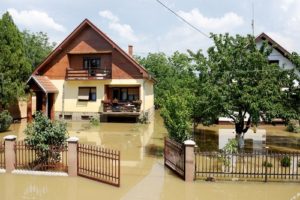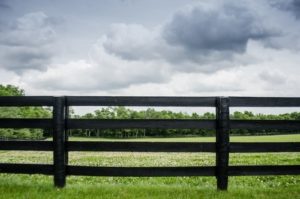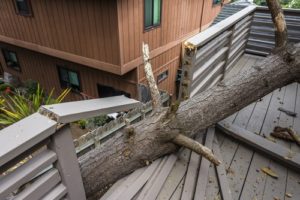Painting Your Fence Before or After Storm Season

No matter where you live, hurricanes and hurricane force winds may become an issue. Even in Southeastern Pennsylvania, a state that doesn’t even have an Atlantic coast, tropical storms and hurricanes have been known to make landfall. While our New Jersey neighbors suffered most of the effects of Superstorm Sandy, Hurricane Irene and Hurricane Floyd were the Philadelphia area’s greatest recent storms.
Severe weather can wreak havoc on your yard and fence. Is there a way to prevent weather-related damage? Here’s how to make sure your fence is in great shape and strong enough to withstand the weather before summer storm season strikes.
Repair any existing damage to your fence
Loose boards, collapsing panels, and rotted posts can cause big trouble when the winds pick up. Not only will these parts of your fence inevitably dislodge, they can take other parts of the fence along for the ride. They may also become projectiles, damaging other items, like roofs, windows, or cars. Who wants the headache of coordinating fence repair when you can prevent it in the first place?

Inspect your fence prior to hurricane season, or whenever the weather is likely to turn stormy, to see if any part needs to be replaced. Wood-destroying insects, sun, water, or freezing temperatures can all cause cracks, rot, shifting soil, or other types of damage to your fence. While an aluminum or vinyl fence may not face as many challenges as a wood fence, you should still ensure it is in tip-top shape. Contact your fence installer or fence manufacturer if you need repairs.
Paint or stain your fence if needed
While it may seem counterintuitive to paint or stain your fence before the start of hurricane season, paint and stain have the effect of protecting your fence, especially from water damage. Paint and stain can seal your wood, making it less susceptible to rot from moisture (either in the air or in the ground) and more resistant to insect infestation. If you own a wood fence, you should paint or stain every year or two to maintain the fence’s finish.
Chipped or older paint may crack and damage more during a storm, with wind and rain beating against it. It’s, therefore, best to repair your paint prior to the storm season.
If you have a vinyl or aluminum fence, one benefit is that you don’t need to paint or stain. This makes your investment in fence maintenance much less than if you own a wood fence. You should, however, make sure the fence’s finish is still intact, and that there are no sections in need of repair or replacement.
Make sure your landscaping is storm-proof
A lot of fence damage, and property damage in general, results from not properly maintaining landscaping. Just like how damaged  fence parts can become projectiles during a storm, damaged, decayed, or otherwise dangerous items like trees and tree branches can become problematic with high winds and heavy rains.
fence parts can become projectiles during a storm, damaged, decayed, or otherwise dangerous items like trees and tree branches can become problematic with high winds and heavy rains.
In order to ensure your landscaping doesn’t become air-scaping, make sure to take care of it prior to the start of storm season. Trim trees on your property to remove damaged branches, or ones that are likely to fall, such as branches that are too heavy or have insect damage. If you have branches that overhang your fence you may also want to pre-emptively remove them. Similarly, you should have dead or dying trees removed by a professional landscaping company or tree surgeon in order to prevent them from falling over or even becoming uprooted and creating a fence mess in strong winds. Even if your trees and tree branches are in good condition, you may want to thin their foliage. Late summer and early fall foliage can be heavy, creating a wind barrier when storms come sweeping through. This creates pressure on your tree, and may lead to a healthy tree being uprooted. Gaps in the foliage allow air to flow through more easily, creating less resistance.
Talk to an expert about repairing or replacing your fence – before or after the storm
If your fence has a manufacturer’s warranty or installation warranty and needs some repair, talk to the appropriate person to get it fixed. If your fence needs more than minor repair, you may have to contact a repair expert, or even have your fence replaced. A fence professional should be able to assess the extent of your fence damage and make recommendations. If your fence has been damaged in a storm it’s important to contact your homeowners’ insurance company right away and then speak with a fence specialist who can get you up and running (and your pets and kids out and playing) again ASAP.
To order fence parts or schedule professional installation,
call 800-431-4303 or contact us online!

